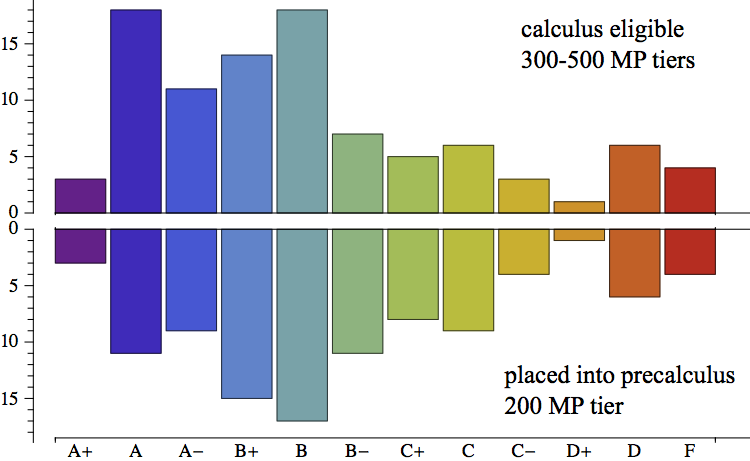The precalculus courses Math 3, Precalculus, and AMS 3, Precalculus for the Social Sciences, focus on the manipulation and interpretation of functions, including linear, quadratic, polynomial, rational, exponential, logarithmic, and trigonometric functions. Math 3 is designed to prepare students for calculus, while AMS 3 emphasizes mathematical modeling of problems in the social sciences.
Who should—or shouldn’t—take precalculus?
If you've reassessed at least twice and your best score is still in the MP tier 200, you may benefit from taking a precalculus course. The learning opportunities offered by the combination of lectures, discussion sections, and office hours could help you master material that you've been struggling with on your own. Some students prefer a traditional course structure, with weekly homework assignments and in-class exams, to a self-study online learning system.
If you've placed into the 300 tier or higher, you've already mastered most or all of the skills taught in AMS 3 and Math 3, and probably wouldn't benefit from spending an entire term reviewing that material.
Psychology majors
The math requirement for the General and Intensive Psychology majors is satisfied by any of the following
• Math Placement assessment in the 300 MP tier or higher,
• an AP Calculus score of 3 or better,
• a passing grade in one of the following UCSC courses: AMS 3 or 6, Math 3, 4, 11A, or 11B, or
• transfer course credit equivalent to one of the above courses.
‘Playing it safe’ isn’t really safe

If you're looking for an easy A, Precalculus isn't your best bet. For students who took Math 3 in Fall 2016, non-passing and middle-of-the-road grades were as common among calculus-eligible students as among students who placed into Precalculus. The graph shows the grade distributions for Math 3, Fall 2016: the bars indicate the percentage of students in each category who earned the associated grade.
Recent UCSC analyses suggest that if you're already calculus-eligible, taking Math 3 before you take your first UCSC calculus course probably won't boost your grade in calculus. (These are average outcomes—your mileage may vary.)
For students in the sciences, making a leisurely start might come at the cost of a frantic scramble to satisfy major declaration requirements a few quarters later, so dive in!
The Mathematical and Formal Reasoning requirement

Your Math Placement score doesn't satisfy any UCSC General Education requirements.
If you've placed into a MP tier that meets all of your other mathematical needs and don't intend to take calculus, take a look at the complete list of courses that satisfy the Mathematical and Formal Reasoning (MF) requirement before you decide on AMS 3 or Math 3. Here are a few possibilities:
If you're intrigued by science but not excited about algebra and trigonometry, Astrobiology: Life in the Universe (Astronomy 16) or Robot Automation (Computer Engineering 8) might be good options for you.
If you're more into music than science, how about Artificial Intelligence and Music (Music 80L) or Harmony and Form in 19th-Century and Early 20th-Century Music (Music 130)?